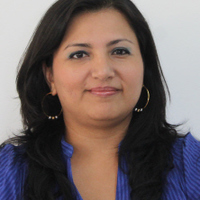Lorena Castro Pérez - Profile on Academia.edu (original) (raw)

Related Authors
Uploads
Papers by Lorena Castro Pérez
Científica Resumen El objetivo de esta investigación fue determinar las habilidades de escritura ... more Científica Resumen El objetivo de esta investigación fue determinar las habilidades de escritura académica de los docentes de la facultad de Ciencias y Humanidades de la Universidad Don Bosco. Se examinó la escritura académica desde dos perspectivas: como habilidad social y como habilidad técnica. La habilidad social abordó la escritura como un fenómeno comunicativo que permite a los autores dialogar con sus respectivas comunidades discursivas posicionándose a sí mismos como expertos en sus áreas. Por otra parte, la habilidad técnica incluyó los conocimientos que los escritores poseen en aspectos como el vocabulario, la puntuación, las etapas del proceso de escritura, el uso de las normas APA y la claridad de géneros de escritura académica. Se utilizó un enfoque cuantitativo, de tipo no experimental, transeccional y de alcance descriptivo. La muestra fue constituida por 28 docentes de la facultad quienes completaron una encuesta ad hoc de 24 preguntas. Los resultados revelan por un ...
This article presents the reflection what emerges from the self-assessment process of the Pedagog... more This article presents the reflection what emerges from the self-assessment process of the Pedagogy Career in Religion from the Catholic University of Temuco. To achieve this, we did an analysis process based on institutional policies and procedures, the guidance of the Church’s Magisterium so as those promulgated by the State, basing from an anthropological, epistemological, pedagogical and theological conception in the western cultural context. However, it seems that this model curriculum does not consider the reality of most students of Pedagogy in Religion, because they belong to a different multiethnic reality and identity located in the south of the country, especially the mapuche culture. This raises the challenge of creating a teacher of religion training plan including the crossing of cultural identities, seeking a professional performance in a constant reciprocal dialogue and in the context of the cultural diversity present in the macro-southern Chile.
Científica Resumen El objetivo de esta investigación fue determinar las habilidades de escritura ... more Científica Resumen El objetivo de esta investigación fue determinar las habilidades de escritura académica de los docentes de la facultad de Ciencias y Humanidades de la Universidad Don Bosco. Se examinó la escritura académica desde dos perspectivas: como habilidad social y como habilidad técnica. La habilidad social abordó la escritura como un fenómeno comunicativo que permite a los autores dialogar con sus respectivas comunidades discursivas posicionándose a sí mismos como expertos en sus áreas. Por otra parte, la habilidad técnica incluyó los conocimientos que los escritores poseen en aspectos como el vocabulario, la puntuación, las etapas del proceso de escritura, el uso de las normas APA y la claridad de géneros de escritura académica. Se utilizó un enfoque cuantitativo, de tipo no experimental, transeccional y de alcance descriptivo. La muestra fue constituida por 28 docentes de la facultad quienes completaron una encuesta ad hoc de 24 preguntas. Los resultados revelan por un ...
This article presents the reflection what emerges from the self-assessment process of the Pedagog... more This article presents the reflection what emerges from the self-assessment process of the Pedagogy Career in Religion from the Catholic University of Temuco. To achieve this, we did an analysis process based on institutional policies and procedures, the guidance of the Church’s Magisterium so as those promulgated by the State, basing from an anthropological, epistemological, pedagogical and theological conception in the western cultural context. However, it seems that this model curriculum does not consider the reality of most students of Pedagogy in Religion, because they belong to a different multiethnic reality and identity located in the south of the country, especially the mapuche culture. This raises the challenge of creating a teacher of religion training plan including the crossing of cultural identities, seeking a professional performance in a constant reciprocal dialogue and in the context of the cultural diversity present in the macro-southern Chile.









